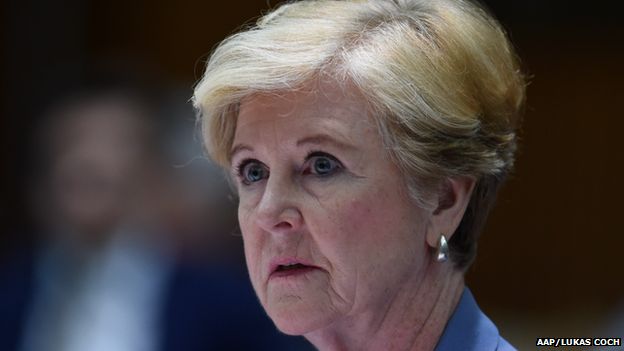Row over Australia Human Rights Commission chief deepens
- Published

Australia's opposition Labor Party has asked police to investigate whether the government tried to induce the president of the Australian Human Rights Commission (HRC) to resign.
Gillian Triggs told a senate committee that she had been asked to resign and offered a new role.
The shadow attorney general has written to the Australian Federal Police (AFP) seeking an immediate investigation.
The HRC released a report condemning the treatment of children in detention.
Their report said that detaining children of asylum seekers violated international human rights law, and called for their release.
'Disgraceful proposal'
Speaking to journalists in Sydney on Wednesday, Mr Abbott repeated his earlier statements that the government had lost confidence in Ms Triggs as president of the HRC.
"What she does is a matter for her," said Mr Abbott in response to a question about whether she should resign.
"As the secretary of the Attorney General's Department has made clear, she was not asked to resign and no inducement has been offered."
On Tuesday, Australia's Prime Minister Tony Abbott launched a scathing attack on the HRC report, saying that it was a "political stitch-up".
Earlier in a senate hearing, Ms Triggs said that she had been asked to resign during a meeting on 3 February by the secretary of Attorney General George Brandis' department.
"I rejected it out of hand," she said, as quoted by ABC News.
Ms Triggs told the hearing that the department's secretary, Chris Moraitis, had said that she would be offered another job with the government.
She added that she had been "very shaken and shocked" by the "disgraceful proposal" and had reminded Mr Moraitis that she had a five-year statutory position.
Forgotten children
In a letter to the AFP commissioner, Shadow Attorney General Mark Dreyfus said: "The attorney general's offer to an independent statutory officer of an inducement to resign her position as president, with the object of affecting the leadership of the [HRC] to avoid political damage to the Abbott government may constitute corrupt and unlawful conduct."
ABC News reported that Mr Dreyfus said that Ms Triggs preferred not to use the term "inducement" but that she had made it clear that the resignation request and the offer of a job had been connected.
Local media reported that Mr Moraitis has denied asking Ms Triggs to resign but said they had discussed the possibility of her taking on another role.
The attorney general admitted to the senate committee that he had lost confidence in Ms Triggs because of the timing of the inquiry into detained children, according to local media.
He added that "as a matter of goodwill" he had told Mr Moraitis that he hoped that she could be encouraged to serve the government in other capacities.
The HRC report, entitled The Forgotten Children, was published earlier in February.
It said a third of detained children had developed mental illnesses of such severity that they required psychiatric treatment.
The number of children in detention has fallen under Mr Abbott's government. He has questioned why the HRC did not launch an inquiry when the Labor government was in power and there were almost 2,000 children in detention centres.
Successive Australian governments have been criticised over their harsh asylum policies, under which asylum seekers are detained for long periods in offshore camps while their applications are processed.
Australia and asylum
- Asylum seekers - mainly from Afghanistan, Sri Lanka, Iraq and Iran - travel to Australia's Christmas Island by boat from Indonesia
- The number of boats rose sharply in 2012 and early 2013. Scores of people have died making the journey
- To stop the influx, the government has adopted hard-line measures intended as a deterrent
- Everyone who arrives is detained. Under a new policy, they are processed in Nauru and Papua New Guinea. Those found to be refugees will be resettled in PNG, Nauru or Cambodia
- Tony Abbot's government has also adopted a policy of tow-backs, or turning boats around
- Rights groups and the UN have voiced serious concerns about the policies and conditions in the detention camps. They accuse Australia of shirking international obligations.